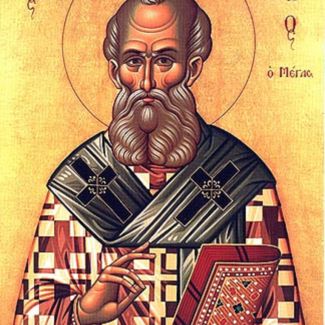Athanasian Creed
Whosoever will be saved, before all things it is necessary that he hold the Catholic Faith. Which Faith except everyone do keep whole and undefiled, without doubt he shall perish everlastingly. And the Catholic Faith is this,
That we worship one God in Trinity and Trinity in Unity. Neither confounding the Persons, nor dividing the Substance. For there is one Person of the Father, another of the Son, and another of the Holy Ghost.
But the Godhead of the Father, of the Son and of the Holy Ghost is all One, the Glory Equal, the Majesty Co-Eternal. Such as the Father is, such is the Son, and such is the Holy Ghost.
The Father Uncreate, the Son Uncreate, and the Holy Ghost Uncreate. The Father Incomprehensible, the Son Incomprehensible, and the Holy Ghost Incomprehensible.
The Father Eternal, the Son Eternal, and the Holy Ghost Eternal and yet they are not Three Eternals but One Eternal.
As also there are not Three Uncreated, nor Three Incomprehensibles, but One Uncreated, and One Incomprehensible.
So likewise the Father is Almighty, the Son Almighty, and the Holy Ghost Almighty. And yet they are not Three Almighties but One Almighty.
So the Father is God, the Son is God, and the Holy Ghost is God. And yet they are not Three Gods, but One God. So likewise the Father is Lord, the Son Lord, and the Holy Ghost Lord. And yet not Three Lords but One Lord.
For, like as we are compelled by the Christian verity to acknowledge every Person by Himself to be God and Lord, so are we forbidden by the Catholic Religion to say, there be Three Gods or Three Lords.
The Father is made of none, neither created, nor begotten. The Son is of the Father alone; not made, nor created, but begotten. The Holy Ghost is of the Father, and of the Son neither made, nor created, nor begotten, but proceeding.
So there is One Father, not Three Fathers; one Son, not Three Sons; One Holy Ghost, not Three Holy Ghosts.
And in this Trinity none is afore or after Other, None is greater or less than Another, but the whole Three Persons are Co-eternal together, and Co-equal. So that in all things, as is aforesaid, the Unity in Trinity, and the Trinity in Unity, is to be worshipped. He therefore that will be saved, must thus think of the Trinity.
Furthermore, it is necessary to everlasting Salvation, that he also believe rightly the Incarnation of our Lord Jesus Christ. For the right Faith is, that we believe and confess, that our Lord Jesus Christ, the Son of God, is God and Man.
God, of the substance of the Father, begotten before the worlds; and Man, of the substance of His mother, born into the world. Perfect God and Perfect Man, of a reasonable Soul and human Flesh subsisting. Equal to the Father as touching His Godhead, and inferior to the Father as touching His Manhood.
Who, although He be God and Man, yet He is not two, but One Christ. One, not by conversion of the Godhead into Flesh, but by taking of the Manhood into God. One altogether, not by confusion of substance, but by Unity of Person.
For as the reasonable soul and flesh is one Man, so God and Man is one Christ. Who suffered for our salvation, descended into Hell, rose again the third day from the dead.
He ascended into Heaven, He sitteth on the right hand of the Father, God Almighty, from whence he shall come to judge the quick and the dead. At whose coming all men shall rise again with their bodies, and shall give account for their own works.
And they that have done good shall go into life everlasting, and they that have done evil into everlasting fire. This is the Catholic Faith, which except a man believe faithfully and firmly, he cannot be saved.
The Short History of the Athanasian Creed
In the realm of Christian theology, the Athanasian Creed holds a significant place as one of the most important statements of faith. This creed is named after Athanasius, a prominent Christian theologian of the 4th century, and it outlines key beliefs of the Christian faith.
What is the Athanasian Creed?
The Athanasian Creed, also known as the Quicunque Vult (Latin for “Whoever wishes”), is a Christian statement of faith that focuses on the Trinity and the nature of Christ. It is considered to be one of the ecumenical creeds, along with the Apostles’ Creed and the Nicene Creed. This creed is used in various Christian denominations, including the Catholic Church, the Eastern Orthodox Church, and some Protestant churches.

Origins of the Creed
The exact origins of the Athanasian Creed are shrouded in mystery, but it is believed to have been written in the 5th century, long after Athanasius’ death. The creed was likely composed in Latin, rather than Greek, which was the common language of early Christian theologians. Despite its name, the creed is not actually written by Athanasius but is attributed to him due to its focus on the key theological issues he championed.
Key Themes in the Creed
One of the central themes of the Athanasian Creed is the doctrine of the Trinity. It affirms the belief in one God who exists in three persons—Father, Son, and Holy Spirit. The creed emphasizes the equality of the three persons of the Trinity while also recognizing their distinctiveness. This reflects the Nicene Creed’s stance on the Trinity, which Athanasius played a crucial role in formulating.
Significance of the Athanasian Creed
The Athanasian Creed serves as a concise summary of key Christian doctrines, particularly regarding the Trinity and the nature of Christ. It affirms essential beliefs that are foundational to the Christian faith and helps to establish common ground among various Christian traditions. The creed is often used in liturgical settings, such as in worship services and during special occasions in the church calendar.
Controversies Surrounding the Creed
Despite its importance in Christian theology, the Athanasian Creed has not been without its controversies. Some have criticized it for its strong language and emphasis on doctrinal precision, arguing that it may exclude those who do not adhere to its strict theological formulations. However, others see the creed as a valuable tool for upholding orthodox Christian beliefs and maintaining doctrinal clarity in the face of theological challenges.
One the main concerns with the Trinitarian theology that that the Creed establishes is that there are several other Christian religions that do not agree with the doctrine of the trinity. In fact the Creed was written in response to other early church leaders challenging the doctrine. (See The History of the Trinity).
Conclusion
In conclusion, the Athanasian Creed stands as a timeless expression of essential Christian beliefs, particularly concerning the Trinity and the nature of Christ. While its origins may be obscure, its enduring significance in Christian theology cannot be denied. Whether recited in a worship service or studied in a theological classroom, the Athanasian Creed continues to shape the way Christians understand and articulate their faith.

